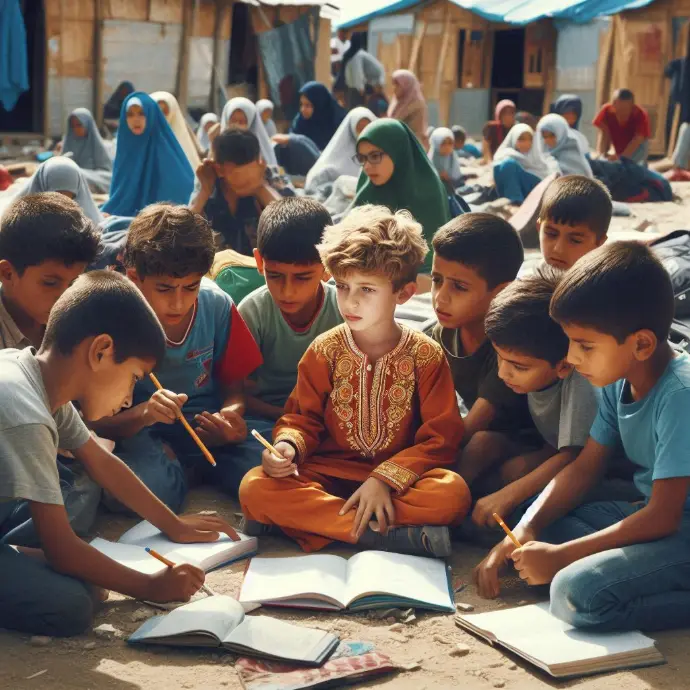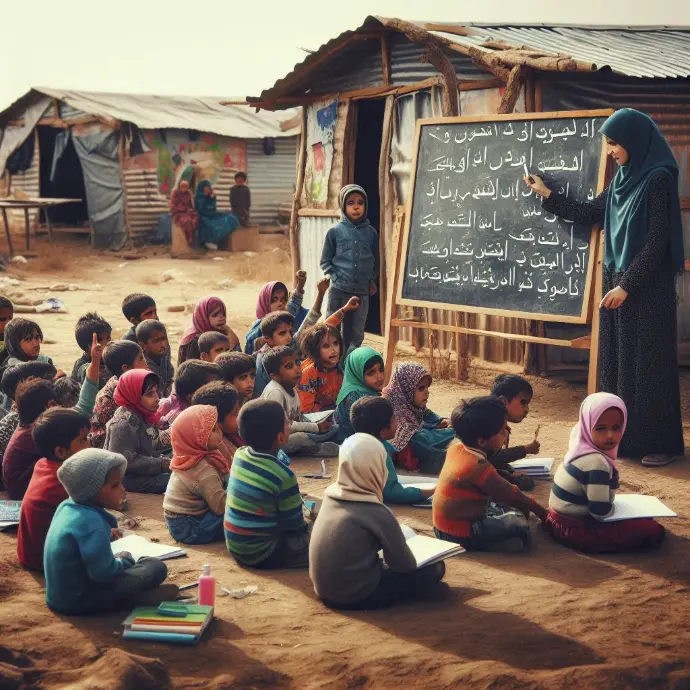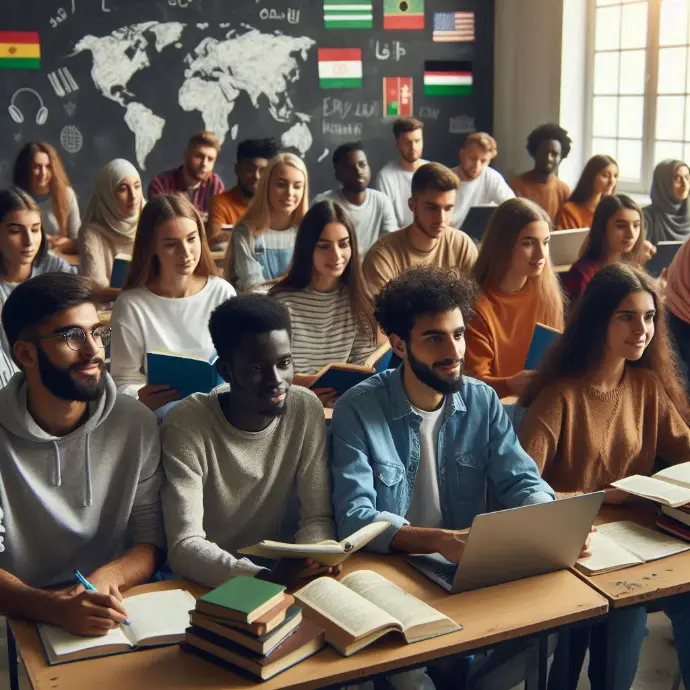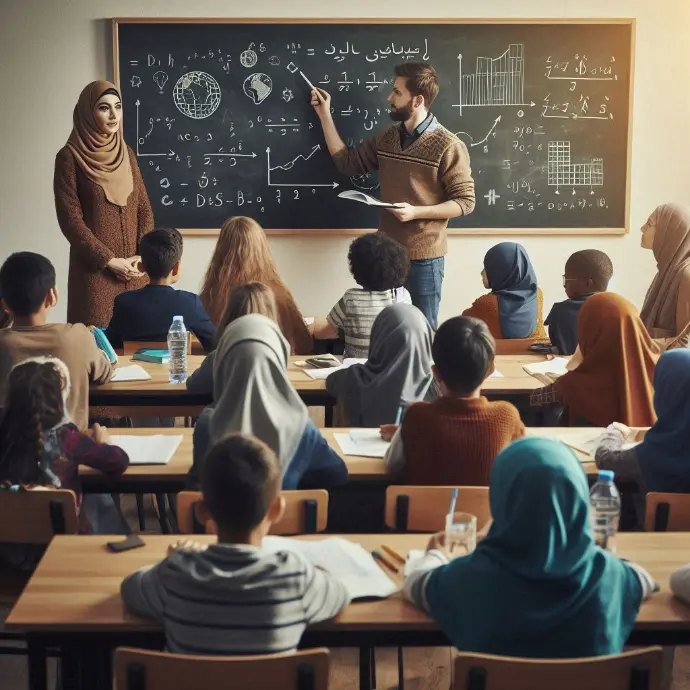Interrupted Education: Problems and Long-Term Challenges of Forced Displacement among Youth
Education for Displaced Persons: A Right and a Duty
In the last four years, nearly one million people were displaced by violence each year. Of these total, it is estimated that at least a third are children and young people between the ages of 5 and 18. In recent years, the country has witnessed a steady increase in the phenomenon of displacement and the way in which violence has excluded thousands of children from the education system. This violent expulsion has been most severe in areas inhabited by Indigenous, Black, and poor rural populations, who in turn have lower educational levels and higher illiteracy rates.

Introduction
In the current context, the forced displacement of young people is an increasingly relevant global problem. This phenomenon, motivated by armed conflict, persecution, violence, and human rights violations, has significant consequences on the lives of young people, particularly their access to education and their comprehensive development. It is essential to thoroughly understand and analyze the long-term repercussions of this situation in order to implement effective strategies to mitigate its impact and restore the fundamental rights of this vulnerable population.
Forced displacement of youth occurs in the context of armed conflict, political, ethnic, or religious persecution, as well as situations of generalized violence. According to the United Nations High Commissioner for Refugees (UNHCR), at the end of 2023, more than 117.3 million people were forcibly displaced worldwide, 40% of whom were under the age of 18. This reality poses significant challenges in terms of human rights protection, especially with regard to access to quality education and the comprehensive development of affected youth.
Young people forced to leave their homes and communities face immense obstacles to continuing their education. The abrupt interruption of their studies, coupled with precarious conditions in places of refuge or transit, has a profound impact on their psychosocial well-being and future prospects. This reality highlights the urgent need to address the long-term consequences of forced displacement on the educational and personal development of affected youth.
Lack of access to quality education significantly limits displaced youth's opportunities for development and growth, perpetuating a cycle of vulnerability and social exclusion. Furthermore, the deprivation of this fundamental right erodes the hope and resilience of this population, affecting their ability to build a promising future in conditions of dignity and well-being.
Educational disruption as a result of forced displacement has profound and lasting repercussions on the lives of affected youth. This situation not only affects their academic development but also impacts their mental health, social integration, and long-term employment prospects. Lack of access to quality education in contexts of forced displacement contributes to the perpetuation of poverty and social exclusion, negatively impacting the overall well-being of young people and their communities.
Educational disruption can lead to feelings of loss, disorientation, and hopelessness in displaced youth, affecting their self-esteem and identity. The lack of opportunities to acquire relevant knowledge and skills limits their ability to fully develop and contribute meaningfully to society in the future. Furthermore, exposure to violence and trauma during displacement exacerbates the impact of educational disruption, creating additional barriers to young people's well-being and emotional stability.
It is essential to recognize that educational disruption not only has individual consequences but also affects the social, economic, and political development of the communities and countries where forced displacement occurs. Lack of investment in the education of displaced youth represents a significant loss of human capital and talent, which in turn hinders progress and sustainable development globally.
Addressing the long-term consequences of forced displacement on young people is critical to ensuring the protection of their human rights, their comprehensive well-being, and their development as individuals and active members of society. The implementation of programs and policies aimed at restoring access to education, providing psychosocial support, and promoting the social integration of displaced youth is essential to mitigating the negative impact of this traumatic experience.
Investing in quality education for displaced youth not only represents an opportunity to rebuild their lives but also contributes to building more just, inclusive, and peaceful societies. Access to education is a fundamental right that empowers young people, provides them with tools to overcome adversity, and enables them to contribute meaningfully to the social and economic development of their host communities.
Addressing the long-term consequences of forced displacement on young people fosters resilience, promotes equal opportunities, and lays the foundation for building a more hopeful and dignified future for this vulnerable population. Recognizing the importance of this work implies a collective commitment to protect and promote the fundamental rights of displaced youth, ensuring they have the opportunity to reach their full potential and contribute meaningfully to global well-being.
Consequences of Forced Displacement on Youth Education
Forced displacement of young people entails a significant disruption to their education, often resulting in academic and cognitive challenges. Lack of access to formal education and discontinuity in learning can lead to difficulties in achieving the educational milestones expected for their age. This disruption can lead to gaps in knowledge and skills, making it difficult to adapt to new educational environments.
Furthermore, exposure to traumatic situations during displacement can affect young people's cognitive ability, altering their ability to concentrate, process information, and retain knowledge. These academic and cognitive challenges can have a lasting impact on their educational and professional development.
It is essential to implement specific educational programs for displaced youth that address both academic gaps and the emotional and cognitive needs arising from their displacement experience.
Forced displacement of young people can have devastating consequences on their mental and emotional health. Exposure to violence, the loss of loved ones, insecurity, and uncertainty can trigger post-traumatic stress disorder, anxiety, and depression in displaced youth. These conditions, if not adequately addressed, can persist over time and negatively affect their overall well-being.
Furthermore, lack of access to specialized mental health services during displacement can exacerbate emotional problems and hinder recovery. It is crucial to provide displaced youth with comprehensive psychological support, including access to specialized therapies and emotional support programs to help them overcome the after-effects of their experience.
Mental health care for displaced youth is not only essential for their individual well-being but also impacts their ability to participate effectively in educational and social settings.
Forced displacement among youth can have significant effects on their social and emotional development. The loss of support networks, separation from friends and family, and exposure to unfamiliar environments can lead to feelings of isolation, disconnection, and difficulties establishing meaningful social relationships.
Furthermore, the experience of displacement can impact self-esteem, self-confidence, and the ability to develop a positive identity. Displaced youth may face challenges integrating into new communities, participating in social activities, and developing strong interpersonal skills.
It is crucial to implement support and guidance programs that address the social and emotional development needs of displaced youth, encouraging the building of support networks, the development of social skills, and the promotion of a positive and resilient identity.
The forced displacement of young people leads to a series of significant limitations in access to educational opportunities. The abrupt interruption of education due to armed conflict, natural disasters, or political persecution can result in the loss of years of schooling. This lack of educational continuity can hinder the reintegration of displaced youth into formal education systems, which in turn limits their prospects for academic and professional development.
Furthermore, forced displacement often involves the sudden flight from homes and communities, which leads to the loss of belongings, personal documents, and, in many cases, access to academic records. This situation makes it difficult to validate previous studies and enroll in schools or universities, perpetuating barriers to accessing quality education.
Limited access to educational opportunities is also reflected in the lack of financial resources to cover tuition, school supplies, and transportation to schools. This reality directly impacts displaced youth and their families, who face difficulties ensuring continuous and adequate education for their children amid the humanitarian crisis they are experiencing.
Factors influencing long-term consequences
The forced displacement of young people carries with it a series of long-term consequences that significantly impact their access to education and their overall well-being. Traumatic experiences during displacement play a crucial role in the development of these consequences, as young people face extremely difficult situations that affect their mental and emotional health.
Exposure to violence, the loss of loved ones, insecurity, and constant fear have a devastating effect on the emotional stability of displaced young people. These traumatic experiences can lead to post-traumatic stress, anxiety, depression, and other emotional difficulties that affect their ability to concentrate in school and actively participate in their education.
Furthermore, the psychological impact of these experiences can lead to self-destructive behaviors, difficulties in forming healthy relationships, and a decrease in self-esteem, which directly influences their academic performance and their ability to plan for a promising future.
Once displaced youth arrive in a host location, it is critical that they have access to resources and specialized support to address the aftermath of displacement and facilitate their reintegration into the education system. Psychological support programs, access to mental health services, and the presence of professionals trained in trauma management are essential to helping these youth overcome the emotional and psychological difficulties they face.
Furthermore, it is crucial that host communities and educational institutions are prepared to provide a safe and supportive environment where displaced youth feel supported and valued. Creating peer support networks, fostering inclusion, and raising awareness about the experiences of displacement can significantly contribute to these youth's adaptation to their new environment.
Financial and material resources also play an important role in access to quality education for displaced youth. The provision of school supplies, uniforms, safe transportation, and other essentials can remove significant barriers and allow these young people to effectively integrate into the education system.
To address the long-term consequences of forced displacement on young people, it is critical to implement educational reintegration policies and programs that focus on providing equitable opportunities and specialized support. These programs must be tailored to the specific needs of displaced young people, considering the impact of trauma on their mental and emotional health.
Education policies must guarantee equal access to education for all displaced young people, eliminating any form of discrimination or exclusion. It is essential to establish specific measures to assess and address individual educational needs, providing flexible education programs, tutorial support, and accelerated learning opportunities when necessary.
Furthermore, teacher training on trauma and resilience is essential for educators to effectively understand and address the needs of displaced young people in the school setting. Creating compassionate, inclusive, and culturally sensitive educational environments is critical to ensuring these young people receive the necessary support to overcome difficulties and reach their full academic potential.
The impact of armed conflict on the region of origin of forcibly displaced youth is profound and long-lasting. Widespread violence, lack of access to basic services, destroyed infrastructure, and a lack of economic opportunities have a significant impact on young people's lives. Constant exposure to violence and psychological trauma can negatively affect their emotional and mental well-being, which in turn impacts their ability to learn and develop appropriately.
Furthermore, armed conflict often disrupts access to education, depriving young people of the opportunity to acquire skills and knowledge necessary for their personal and professional development. Lack of access to quality education limits their future prospects, perpetuating a cycle of poverty and marginalization. The impact of armed conflict on the region of origin of forcibly displaced youth is one of the root causes of the disruption of their education and has long-term implications for their individual development and society as a whole.
Forced displacement as a result of armed conflict has a devastating impact on the emotional, social, and economic stability of young people. The lack of security, the loss of support networks, and uncertainty about the future contribute to an environment in which it is extremely difficult for young people to focus on their education and plan for the future. Understanding the impact of armed conflict in displaced youth's region of origin is critical, as this allows for more effective addressing of the educational and emotional needs of this vulnerable population.
Mitigation and support strategies for displaced youth
Forced displacement can have a significant impact on the mental and emotional health of young people. Given this reality, various mitigation and support strategies have been implemented to address the needs of this vulnerable group, focusing on psychosocial care, educational reintegration, and access to mental and emotional health services.
Psychosocial support programs play a fundamental role in assisting displaced youth, offering safe spaces to express their emotions, receive guidance and emotional support, and strengthen their skills in coping with stress and trauma. These programs are typically implemented by humanitarian organizations, educational institutions, and victim assistance centers, providing individual and group support, stress management workshops, recreational activities, and specialized therapies.
The effective implementation of psychosocial support programs requires the training of specialized professionals in psychology and social work, as well as close collaboration with local communities to understand the specific needs of displaced youth and tailor interventions appropriately.
It is essential to emphasize that these programs not only contribute to the mental and emotional health of young people but also positively impact their overall well-being and their ability to actively participate in their educational and social reintegration processes.
The interruption of education due to forced displacement can have long-term consequences for young people's academic and personal development. To mitigate these consequences, educational reintegration initiatives have been implemented that seek to facilitate access to formal education, improve skills, address special educational needs, and promote inclusive school environments.
These initiatives are often promoted by government agencies, non-governmental organizations, and coalitions of humanitarian actors and focus on creating flexible education programs, training teachers sensitive to the needs of displaced youth, providing adapted educational materials, and strengthening school infrastructure in areas affected by displacement.
Furthermore, the participation of local communities, including parents and community leaders, has been found to be a determining factor in the success of these initiatives, as it contributes to creating supportive environments that favor young people's school reintegration.
Access to mental and emotional health services is essential to ensuring the comprehensive well-being of displaced youth. Despite the difficulties that may arise due to lack of resources or geographical barriers, it is crucial that these services be available and accessible to those who have experienced forced displacement.
Health organizations, both governmental and non-governmental, have implemented strategies to bring mental health services closer to affected communities, including the creation of mobile clinics, the training of community health promoters, and the integration of mental health services into primary care services.
These efforts seek to ensure that displaced youth have access to psychological evaluations, specialized therapies, medication when necessary, and supportive spaces where they can express their emotions and receive the necessary support for their emotional recovery.
Forced displacement in young people can have a significant impact on their ability to cope with difficult situations and recover from adversity. The disruption of their education, the loss of their social support network, and exposure to traumatic experiences can negatively impact their mental and emotional health. However, many young people who have faced forced displacement also develop coping and resilience skills that allow them to overcome these difficulties.
In many cases, the experience of forced displacement leads young people to strengthen their ability to cope with stress, adapt to changing environments, and find creative ways to overcome challenges. Through informal education, community support, and connecting with their own personal strengths, displaced youth can develop resilience that allows them to cope with long-term difficulties and build a more hopeful future.
It is critical to recognize and support the development of these coping and resilience skills in displaced youth, providing them with safe spaces to express their experiences, access mental health resources, and establish meaningful connections with adults and peers who can support their emotional well-being. In doing so, these young people are provided with the necessary tools to address the long-term consequences of forced displacement and build a solid foundation for their future personal and academic development.
The role of the community and organizations in protecting educational rights
Community participation plays a fundamental role in the educational inclusion of young people affected by forced displacement. Local communities, non-governmental organizations, and human rights defenders work together to identify barriers to access to education. Through awareness-raising, resource mobilization, and the creation of specific programs, these entities can advocate for the implementation of inclusive educational policies that address the needs of displaced youth.
Community participation is not limited to identifying challenges but also involves creating sustainable solutions. This can include training teachers in inclusive teaching strategies, establishing psychosocial support programs, and promoting safe and welcoming educational environments for young people affected by forced displacement. Active community engagement is essential to ensuring that displaced youth have the opportunity to access quality education.
Community mobilization around educational inclusion not only benefits displaced youth but also fosters social cohesion and solidarity. By working together to overcome educational barriers, communities can strengthen their ties and create more compassionate and equitable environments for all their members, regardless of their origin or social status.
Collaborative approaches involving governments, international organizations, NGOs, educational institutions, and civil society are critical to ensuring access to quality education for displaced youth. Collaboration between these entities allows for the identification of gaps in the education system and the implementation of effective strategies to address them.
Resource mobilization, coordinated planning, and the sharing of good practices are key elements of collaborative approaches. These joint efforts can lead to the creation of education programs tailored to the specific needs of displaced youth, specialized teacher training, and the implementation of comprehensive psychosocial support measures.
Furthermore, collaboration between different actors can have a positive impact on policymaking, promoting legal and regulatory frameworks that protect and promote the right to education of displaced youth. The collective influence of these collaborative approaches can amplify the voices of displaced youth in educational forums and advocate for meaningful changes at the national and international levels.
Advocating for educational rights in displacement contexts involves concrete actions to protect and promote access to quality education for affected youth. This may include documenting cases of rights violations, legally representing displaced youth before educational authorities, and raising awareness about the importance of education in humanitarian crises.
Human rights defenders, NGOs, and international organizations play a critical role in advocating for the educational rights of displaced youth. Through advocacy campaigns, research reports, and legal actions, these entities seek to highlight the barriers displaced youth face in accessing education and advocate for effective solutions at the local, national, and international levels.
Advocating for educational rights also involves promoting safe and protective educational environments, free from discrimination and violence. This requires the implementation of policies and practices that safeguard the right to education for all young people, regardless of their migration or displacement status. Actively upholding these principles is crucial to ensuring that displaced youth have the opportunity to develop their potential through education.
Conclusions
The forced displacement of young people has a lasting impact on their lives, especially regarding their education. The interruption of their academic training, the loss of their family and social environment, and exposure to situations of violence and conflict all contribute to significant emotional and psychological scars. These traumatic experiences can negatively affect their personal development and integration into the host society.
Furthermore, the lack of access to quality education limits these young people's future opportunities, hindering their employment and active participation in society. This prolonged situation of displacement can generate a cycle of vulnerability and exclusion, perpetuating their marginalization in education and society.
Therefore, it is essential to understand and address the profound impact that forced displacement has on the lives of young people, recognizing the importance of implementing specific measures for their comprehensive protection and support.
Faced with the challenge of ensuring access to quality education for displaced youth, the implementation of inclusive policies and support strategies that address their specific needs is crucial. These policies must ensure non-discrimination, equity, and the inclusion of these young people in the education system, ensuring that they receive the necessary attention and support to overcome the barriers arising from displacement.
Furthermore, it is essential to promote collaboration between governments, non-governmental organizations, and the international community to design and implement educational programs adapted to the realities of displaced youth. These support strategies may include non-formal education programs, psychosocial counseling, and measures for the validation and recognition of their previous studies.
The adoption of these inclusive policies and support strategies will help mitigate the negative impact of forced displacement on young people's education, promoting their comprehensive development and integration into the host society.
Forced displacement poses significant challenges for the protection of the educational rights of affected young people. Lack of documentation, language barriers, discrimination, and precarious living conditions in host locations represent significant obstacles to the full exercise of their right to education.
However, this challenging context also opens up opportunities to implement innovative and collaborative approaches that ensure equitable access to quality education. Resource mobilization, sensitized teacher training, curriculum adaptation, and the use of technology for distance learning are some of the opportunities that can be leveraged to protect and promote the educational rights of displaced young people.
In this regard, the commitment of government actors, civil society, and the international community is essential to overcome the challenges and seize the opportunities presented by the context of forced displacement, ensuring that displaced youth can fully exercise their right to education, thus laying the foundation for their personal development and their contribution to a more inclusive and just society.
Universal Declaration of Human Rights
Article 26
- Everyone has the right to education. Education shall be free, at least in the elementary and fundamental stages. Elementary education shall be compulsory. Technical and professional education shall be made generally available and higher education shall be equally accessible to all on the basis of merit.
- Education shall be directed to the full development of the human personality and to the strengthening of respect for human rights and fundamental freedoms. It shall promote understanding, tolerance and friendship among all nations, racial or religious groups, and shall further the activities of the United Nations for the maintenance of peace.
- Parents have a prior right to choose the kind of education that shall be given to their children.

 IHRO NEWS
IHRO NEWS

